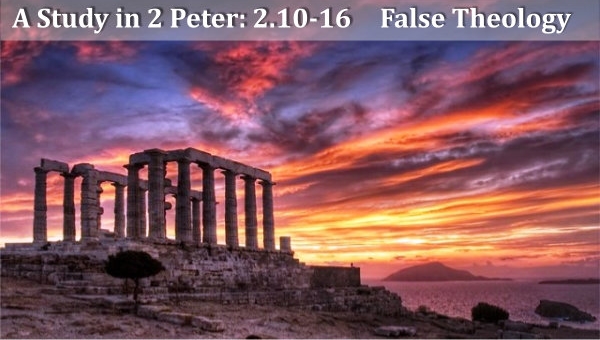By Tyson Thorne

“God hates me” the friend across the table from me announced. At first I wasn’t sure if he was quoting Danny Glover in Lethal Weapon or if he was serious. My friend has been deeply struggling with his faith for some time, and this was a release. He was serious, and he said it with a good deal of malice. I could have tried a gentle approach, but given the nature of the statement and his attitude I decided to be direct. “Don’t presume to speak for God,” I responded. “Especially when God says the opposite. He loves you.”
Usually I’m more like Paul when it comes to conflict. A healthy debate where emotions are kept in check is my go-to method. Maybe I’ve fallen under the influence of Peter during this series when I decided on the harsher direct approach, and perhaps that’s not a bad thing. Peter tells us at the start of chapter two that false teachers have slipped in among us, and that we tolerate them because of their fine sounding words. But bad theology is never something to be tolerated or taken lightly. False teachers only impact our churches when we soft pedal our response or give credence to their ideas through debate rather than shutting down the false teaching immediately.
Of course there is room for a softer approach. If the person is a new believer or even an unbeliever seeking truth then a more reasoned and corrective argument ought to be made. Barring this, however, we owe it to God and our fellow believers to affirm good theology and denounce false teachings quickly and succinctly. False teachers are usually bold in pronouncing their errant beliefs, as Peter indicates in 2.10b-16:
Brazen and insolent, they are not afraid to insult the [angelic] glorious ones, yet even angels, who are much more powerful, do not bring a slanderous judgment against them before the Lord. But these men, like irrational animals – creatures of instinct, born to be caught and destroyed – do not understand whom they are insulting, and consequently in their destruction they will be destroyed, suffering harm as the wages for their harmful ways. By considering it a pleasure to carouse in broad daylight, they are stains and blemishes, indulging in their deceitful pleasures when they feast together with you. Their eyes, full of adultery, never stop sinning; they entice unstable people. They have trained their hearts for greed, these cursed children! By forsaking the right path they have gone astray, because they followed the way of Balaam son of Bosor, who loved the wages of unrighteousness, yet was rebuked for his own transgression (a dumb donkey, speaking with a human voice, restrained the prophet’s madness).
“Brazen and insolent” is how Peter describes false teachers. In Peter’s day, it was apparently a hallmark for false teachers to speak badly about God’s messengers, and possibly even about God. Today it is usually a bit more insidious. A few weeks ago I had a conversation with a person who was trying to convince me that the Holy Spirit was female. She argued from Genesis 1.26, where God says “Let us make man in our image” and them makes Adam and Eve. Since God is “Father” and Jesus the “Son” then it stands to reason that the Holy Spirit must be the female part of the image. I informed her that the “image of God” has nothing to do with gender, but rather the first couple’s inclination to righteousness, their sinless state, and their ability to be creative. I then mentioned she would have to do something about Jesus’s description of the Holy Spirit as “the Spirit of truth, whom the world cannot accept, because it does not see him or know him. But you know him, because he resides with you and will be in you” (John 14.17).
Peter also says false teachers are irrational and always looking for their next opportunity to sin. One leads to the other; when we decide we are going to pursue a sinful path rather than a godly one, we find ways to rationalize our decision. This process leads to irrational thought based on a false idea about God. He points to the false prophet Balaam as an example. If you are not familiar with this Old Testament character, I won’t ruin the chance to get to know him. The story is rather humorous and may be found in Numbers 22.18-35.
Peter isn’t done talking about false teachers yet, so neither are we. The rest will have to wait, however, until tomorrow.
|
|
